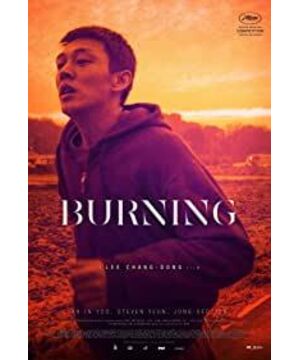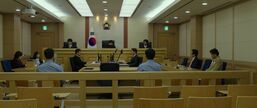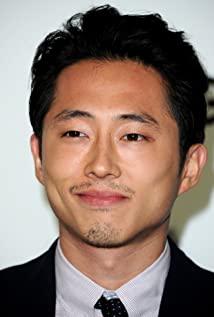#1 Adaptation and controversy
In fact, before Haruki Murakami's short story, Li Cangdong had also adapted other works. In 2007, he made the novel "The Story of Insects" by Li Qingjun based on real events into "Miyang", which also became a turning point for Li Cangdong.
After the release of "Oasis" in 2002, film critic Zheng Shengyi wrote an article criticizing the problem of female "propsization" in Li Cangdong's films : "Li Cangdong's films have always been like this. In his films, without the sacrifice of women, the male soul cannot Complete purification. But the female soul must stay where it is, and in the end it is nothing."
Li Cangdong could not refute this. On the day the film review was published, he, who was a professor at the university, suddenly suspended the lecture, cut off contact with all the students, stayed behind closed doors, and spent a week introspection at home. After five years of silence, he promoted Jeon Do-yeon to the post of Cannes film queen with "Miyang". Three years later, "Poetry" was also the leading actress of Yin Jingji and won the Cannes Best Screenplay Award.
After a lapse of eight years, the new work "Burning" is again adapted from a novel. Japan's NHK threw an olive branch to Li Cangdong and invited him to shoot Haruki Murakami's works. Under the suggestion of co-writer Wu Jingmei, he finally chose the short story "Burning Warehouse". The adaptation also referred to William Faulkner’s short story "Burning Stables". The relationship between the protagonist Zhong Xiu (played by Liu Yaren) and his father and his father’s court disputes in the film obviously draw lessons from Faulkner’s original work. Murakami’s short stories did not mention class issues. Despite Faulkner’s involvement, the portrayal of class differences in "Burning" did not come from Faulkner, but more from the director’s thinking about the current social reality in South Korea.
"Burning" burst into praise at the Cannes Film Festival, breaking the record of the scoring of the journal. Film critics in South Korea appear to be more calm, with an average score of 7.6, which is still far from the previous films that have exceeded 8 points.
Some South Korean feminists criticized Lee Cangdong for making female characters disappear . Film critic Park Woo Sung (transliteration, 박우성) also accused the film of "using disappeared women as the driving force of the plot" , but it seems inappropriate for Lee Cangdong to carry this pot. After all, it is written in the original short story that the heroine disappeared. Is it to be blamed on Murakami Haruki? No matter whether it is the original work or the movie, the story of "Burning" never takes women as the sacrifices for the growth and purification of male characters. Compared with the original work, Hai Mei (played by Jeon Jong Suk) is more independent and self-conscious.
"Now tell the truth!" This line of slogan as a movie poster is likely to cause misunderstanding. People who have not watched the movie may think that this sentence comes from a critical suspenseful moment. The fact is that not long after the opening, Haimei said this to Zhong Xiu jokingly in her rental house. Lighter than expected. This line is misplaced like a joke, perhaps it should have come from Zhong Xiu's mouth, but Zhong Xiu has never asked such a question, and the so-called "truth" has never been clearly revealed.
Lee Cangdong, who has a background in writing novels, pays more attention to film texts than other writerist directors in South Korea, using symbols and metaphors, such as the mirrors and branches in "Oasis", and the sunlight in "Miyang". As Li Cangdong's first suspense film, "Burning" is difficult to compare with the previous one on many levels. Even if Murakami's original text is inherited and developed, it is difficult to capture the human nature themes and highly intense emotions deeply excavated in Li Cangdong's previous scripts, except for the slightly written lines in the film. Of course, this is not to say that the film completely abandoned these explorations for suspense, but that the huge ambition of "mystery" hides other possibilities to some extent. This ambition can be clearly felt from the lens scheduling and plot setting.
"Burning" blurs the boundaries between reality, dreams, and creation, constructing a mysterious world, trying to establish a connection between the unsolvable suspenseful presupposition and the unknowable anger of the young generation, about the "mystery". But as just said, this connection is blocked by the intentional device, so the emotion appears weak. Such a suspenseful presupposition with clear intentions may remind people of "The Cry." Luo Hongzhen uses editing techniques to create illusions, leading to two diametrically opposed interpretations; while the film uses the open setting of virtual reality and existence to create multiple possibilities that are almost incomprehensible. (It is not accidental that the texture and tone of the film's photography are similar to "The Cry". Li Cangdong invited the "Cry" photography supervisor Hong Qingbiao to take the shot.)
In fact, after watching the movie, most viewers can easily give a convincing "truth", just as Murakami suggested in the original work, but "Burning" is obviously more complicated than the original, and it is no longer just staying at Exploring the metaphorical texts of symbolic meaning requires us to constantly ask ourselves: "Does it exist?" and "Is this real?" , and further question the meaning of whether it exists or not, and whether it is true or not. .
"Burning" itself is about "making mystery", but what is important to the audience is not "mystery solving" but "mystery finding". The ambiguity between existence and reality is not only the mystery of the events in the film, but also the "world itself is like a mystery" that the director talked about. It was "unspeakable" from the beginning. Therefore, there is no need to rush to find answers, and there is no answer in this review. Before trying to solve the mystery, we need to think clearly about a question, that is, "Where does the truth in the movie end?" This is also a question that was not raised in Murakami's original work.
#2 Image of the Trapped Young Generation
Both Zhong Xiu and Haimei in the film belong to the typical young people at the bottom of the city, struggling for their livelihoods or dreams in poor living spaces. In fact, similar images have been seen frequently on Korean screens in recent years. The space setting with dim tones and the depression that is difficult to erase seem to have become the "standard" of realism.
South Korean commentator Xu Wenyong once mentioned a new term: "rental realism" . In recent decades, in Korean films dedicated to presenting contemporary social ecology, young generations are still trapped in cramped rental houses. Although the form of space has changed slightly, these young people “still have no place to stay. Exiled elsewhere" .
Haimei and Zhongxiu are also such exiles. The former owed his credit card debts and left home to live in Africa, working to earn money to travel to Africa, the latter after graduating from university with a dream of writing novels to work part-time, because his father was detained for violent crimes, he had to return home to watch the house and raise cattle. In contrast, Zhong Xiu's situation is worse than Haimei's: economic difficulties + family difficulties.
Haemi's new friend Ben (Steven Won) is completely different from them. The location and space of the three characters directly reflect the corresponding social class. Ben lives in a luxury apartment in Seocho District, Gangnam; Hae Mi lives in oneroom rental house in Houyandong at the foot of Nam Mountain; Jong Soo is away from downtown Seoul and lives in his rural home in Manyu-ri, Paju, Gyeonggi Province.
In the lighting treatment, the three spaces are also deliberately distinguished. Ben's beautifully decorated apartment is always set with bright and warm lighting at all times. Haimei’s rental house is north facing, with a double bed, almost no lighting in the interior, and all natural light shots. When the weather is fine, the glass of the Nanshan Tower outside the window can briefly project sunlight on the wall of the room, so Haimei can have a few minutes of reflection Sunlight. The scene of Zhong Xiu’s house is even darker. In this space called "home", the only light that belongs to him is the cold reflection of the TV screen projected on the glass late at night (see the table lamp later), we can't even find it. To a bed, that old thick sofa is his only bedding.
The young generation is trapped in a limited space, and their bodies look for exits in their own ways. There are three scenes in the movie showing images of the body: the love affairs in Haimei's rental house, the dance of Zhong Xiuzhai Qian Haimei, and the back of Zhong Xiu walking naked towards the truck. These are scenes that do not exist in the original book. The two trapped souls outlined through the image of the external body, from the loneliness and dryness of reality, to comfort through sex, to freedom through marijuana and dance, and release through violence.
In the original work, when the three of them were drinking at "Me" (Zhong Xiu)'s house, Haruki Murakami wrote that "She" (Haimei) played Miles Davis' "Airegin". This cheerful ensemble of trumpet and piano is replaced in the film with the lyrical and long "Generique", from Miles Davis's soundtrack for Louis Mahler's "Elevator to the Gallows" (1958). When the music sounded, Jeanne Moreau in the movie once wandered the streets at midnight looking for her lover. Whether there is a tribute here is yet to be known. Haemi’s dance under the sunset seems to also mean a certain pursuit. Her back after taking off her jacket is projected in the sky. The lens fully presents the indescribable "magic moment" in Murakami's works.
If Haimei’s half-naked dance is a visual presentation of Murakami’s textual aesthetics, then Zhong Xiu’s naked figure and steps are closer to the typical marginal figures described by Li Cangdong. Whether it’s an unconventional sex scene, semi-naked or fully nude scenes, at the moment when they take off their clothes, Zhong Xiu and Haimei seem to be making some kind of declaration in front of the camera, with an unexpected frankness, declaring that they are completely other than that. Nothing. Although surrounded by powerlessness and despair, they are still the masters who dominate their bodies.
Compared with the characters in Li Cangdong's previous works, the settings of Zhong Xiu and Hai Mei are closer to the reality around us. Hae Mi’s sentence "My face has been reshaped, let’s be beautiful!" seems childish and ridiculous. Her plastic surgery and sales model professions outline the consumption of women’s appearance in contemporary Korean society. At the same time, she is close to the "38 line" in Jong Soo. The frequent broadcasts of North Korean political propaganda in South Korea seemed to convey a certain marginalization and anxiety. The foreign women around the village elder elder faintly hinted at the reality of Southeast Asians working in South Korea. The localization of these original works also reflects the director and screenwriter's observation and understanding of Korean society.
#3 Class, anger and identity
One of the most obvious differences between "Burning" and the original is the resetting of character classes. The protagonist of the novel, the 30-generation middle-class married male "I", becomes the 20-generation impoverished graduate Zhong Xiu. "She" who studied pantomime and modeled for his livelihood kept the original setting, and removed the hints related to compensated dating; Ben has not changed much, but the background of trading in the original book is not explained. Now he really becomes Zhong Xiu The so-called "great Gatsby"-a rich man who doesn't know what occupation he does, but is generally a mystery.
Li Cangdong, who was born in 1954, undoubtedly belonged to the established generation of this society. He mentioned the word "young" countless times in interviews and the anger and powerlessness of the younger generation. He believed that the reason for this anger was nowhere to be seen. Just like Zhong Xiu's question, why this Ben, who is not a few years older than him, can lead such a rich life? This is clearly an unsolvable problem.
The class difference between Zhong Xiu and Ben is obvious, and this huge difference gradually appears as the plot unfolds. It would be too arbitrary to attribute Zhong Xiu's anger only to inexplicable class differences. What Li Cangdong wants to talk about is definitely not the "hatred of the rich" and "revenge" of the low-level boys. Capital pulls apart social classes and exacerbates the two-level division. When the balance tilts sharply, what is the state of the young people at the bottom? The director tells the story of such young people's encounter with the "mystery" of this world.
The chattering scenes between Haimei and Ben and friends seem to suggest the possibility of straddling classes, but is it really possible? As a bystander, Zhong Xiu witnessed Ben's new salesperson's new girlfriend becoming the second Haimei, and a similar scene was staged again. Haimei once told them about her experience in Africa, and she devoted herself to performing dances of "little hunger" and "great hunger"; the new girlfriend showed off the Chinese she knows with eloquence and exaggerated imitating the expressions and gestures of the Chinese.
There are some questions in these two areas that are worth thinking about. When two women meet the upper class, why do they only talk about foreign experiences, and why do they need to work hard to "act"? Performance may be the appropriate word, to please others through foreign experience and performance, and to express self-worth with rare conversations that are relatively unfamiliar to ordinary Koreans. The gleeful performance seems to be the hope of crossing classes, but in fact it is very sad. It is closer to a desperate struggle, struggling to blend in with other classes, and struggling to climb to the top of the pyramid. Haimei is telling sincerely, and Ben's friends are clearly watching a performance frivolously. In the end, Haimei became a consumer product that could be replaced at will, just like a salesperson girl.
For Zhong Xiu, Haimei is irreplaceable. She is not only a lover and an object of sexual fantasies, but also connected with Zhong Xiu's past. She is the carrier and witness of his past memories. When Haimei disappeared, all the memories were unmatched, as if there were no traces of existence. While looking for evidence of existence, Zhong Xiu has made his own choice (or an imaginary ending created through novels), although the answer has not yet been determined.
While showing the class difference between Zhong Xiu and Ben, the film also seems to imply the same connection between the two different identities. Zhong Xiu, who wrote the novel, is the protagonist of the story and the creator of the story. The boundary between the reality he experienced and the fiction he created is quite blurred, so what is the relationship between him and Ben? Is Ben a completely real character, half-truth, or completely fictitious? When Ben talked about burning the greenhouse, he mentioned the balance of "simultaneous existence"-both in Africa and South Korea, both in Seoul and Paju. These sentences from the original work seem to be attributed to Zhong Soo's Creation concept.
No matter where the boundaries of reality and fiction are, even if we regard the entire film as a novel written by Zhong Xiu, the connection between him and Ben cannot be ignored. The box in Zhong Xiu's cabin, the entire row of knives in the box, and the box in the bathroom closet in Ben's house, the entire row of makeup brushes in the box. What the movie does is not only present their images, but also really "use" these props in the plot. What did Zhong Xiu do with a knife? What did Ben do with makeup brushes? Are these two behaviors essentially related? When we think of this, we recall the scene of Zhong Xiu sneaking into her house and Ben’s bathroom and opening the box. Perhaps we can find the similarities between the two. Zhong Xiu is actually facing the projection of the same self. He and Ben seem to be very different. But they are connected. They are young men of different classes. They are in the relationship of rivals, as well as the relationship between the character and the author. Part of Zhong Xiu's self is projected on Ben, and he himself participates in the story as an independent character and is also a narrator outside of the story.
In "Burning", what is burning? The title "Burning" and the imagery of "fire" can be regarded as an outburst of anger. From Zhong Xiu's childhood experiences, the lighter, the burning of the greenhouse, the pictures on the exhibition, etc., to the fire that included the extreme choices made by Zhong Xiu in the end. The anger of his father, the emotions and desires Zhong Xiu could not fill up, the loss of "memory" caused by the disappearance of Haimei, etc. all provided the premise for this kind of outbreak.
When we step out of the theater, we will find that the real world in front of us is running like a movie. If you don't get confused by too many installations when watching the movie, you don't get too trapped in "mystery solving", and if you think more from the emotional angle of the characters, when you return to the real world again, you will probably feel a sense of chills in your back. All kinds of young people still have to face real but mysterious life formulas, trying to find their own answers in unsolvable despair and powerlessness. It can only be said that this movie is too focused on the suspenseful setting, highlighting the mystery while hiding these extremely human things in a low-key manner, about silent tolerance and attempts, and deep compassion for "people". This part that is not on the surface may be the Li Cangdong that we have been familiar with.
#4 The mystery of existence and reality (more spoilers, please read carefully if you haven’t watched the movie)
Like the original work, the film also takes "Haimei Disappears" and "Ben Burns the Greenhouse" as the two main puzzles, and the two are intertwined in the second half. "Burning" implanted more props and devices (objects or animals) as clues, and Zhong Xiu followed these clues to find evidence.
The brilliance of the script lies in the setting of unsolved puzzles interspersed with clues. We followed Zhong Xiu to pursue different witnesses and evidences. In the end, we held contradictory testimonies in our hands. Therefore, until the last two There is still no definite answer to the main puzzle; the second is the unbounded mixture of the three narratives of reality, dreams and creative fiction, so whether the passage of proof itself is reality is also worthy of scrutiny. Reflections on the status quo of contemporary society and young generations.
Taking the opportunity of Haimei to perform a pantomime, the movie seems to imply something to us from the beginning. Haimei ate the non-existent oranges and told Zhong Xiu's tricks to perform, "Don't think that oranges are here, but forget that they are not there . " Regarding the question of existence and reality, the movie is followed through clues such as cats, wells, greenhouses, and watches.
First of all, does Haimei's cat exist? Haimei mentioned that it would never show up in front of strangers. Zhong Xiu was suspicious of the existence of cats. Haimei asked, "Will I call you here to feed a cat that doesn't exist?" (Existence) . Zhong Xiu said, "Then, should I forget that it is not there?"-This sentence corresponds exactly to what Haimei said when she performed a pantomime (doesn't exist) . After that, Zhong Xiu placed cat food several times, but the cat never showed up, but for the first time he clearly saw cat poop (existing) , and after several shots, he deliberately avoided the appearance of cat food and litter box. After Haimei disappeared, Zhong Xiu told the landlord that he would enter the house to feed the cats. The landlord said that there were no cats here at all and that cats were forbidden (non-existent) . After Zhong Xiu went in, they found that all cat food and litter box disappeared (non-existent) . The cat “existing” in Haimei’s mouth may be a real existence, or it may be a subjectively imagined existence. Her dialogue with Zhong Xiu seems to be teaching pantomime, teaching him to forget the absence of cats, and then Zhong Xiu enters Haimei pantomime. The world of "Forget the absence", the camera is not lying, but the subjective vision of "forgetting the absence" in the pantomime.
Secondly, is the well story told by Haimei true? Does the well exist? Zhong Xiu asked Haimei's family to verify this. They claimed that Haimei was lying, there was no story of falling well, and there was no well (non-existent) near her hometown . Next, Zhong Xiu asked the grandfather of the town for verification, and the uncle also said that there seemed to be no well (not existing) . Finally, Zhong Xiu asked his mother, only her mother gave an affirmative answer, indicating that there had been a well (existing) . If the whereabouts of the cat is related to the mystery of Haimei's disappearance, the existence of Jing has become a kind of evidence to verify the existence of Haimei, and it is also evidence of Zhong Xiu's past memories.
Finally, there is a question about Ben. Is he related to the disappearance of Haimei? Cats and watches are two specious pieces of evidence. Is the cat in Ben's house Haimei's cat? Obviously, this cat can meet strangers (not-irrelevant) , Zhong Xiu called out the name of Haimei Cat and successfully caught it (is-relevant) . The second is the pink watch in the drawer that is exactly the same as Haimei (related) , and the same watch worn by Haimei’s promotional model colleagues seems to be cleaning up Ben's innocence (irrelevant) .
Regarding "burning the greenhouse", does burning the greenhouse allude to "killing"? Ben said that the greenhouse had been burned. Zhong Xiu searched the greenhouses near his home, and no one was burned (yes-related) . Recalling Haimei’s lines, she said that she wanted to disappear from this world, "as if it never existed"; when talking about the special hobby of burning greenhouses, Ben also used exactly the same expression, "(after the greenhouse was burned) It’s as if it never existed" (Yes-related) . When Zhong Xiu asked about Ben Haimei's whereabouts, he said that he didn't know (irrelevant) .
These trivial clues provide evidence for solving the puzzle, but the process of finding evidence and the evidence itself seem to be more important than the answer to the puzzle. Zhong Xiu is not only searching for the whereabouts of the missing lover, but also looking for evidence of existence. As Ben said, "I can't know if it is sad, because there are no tears as evidence." Zhong Xiu tried to find evidence of his lover and self-memory. Ironically, when Haimei disappeared, all the evidence denied the existence of the memory of the two people—except for their mother. However, is the meeting with the mother real?
This is related to the distinction between reality, dreams and fiction. It may be a dream to trace Ben to the lake, so is it true that the mysterious call is connected to see his mother? When answering the phone, the desk lamp was turned on. The "lighting up" occurred in Zhong Xiu's house. It was slightly abnormal. There was no light in the living room. Zhong Xiu woke up many times and the desk lamp never turned on. The scene of meeting with his mother was even more abnormal. The mother of the family reunited with her son. The brightly-dressed mother focused on playing with her mobile phone, giggling and borrowing money from Zhong Xiu, as if the director randomly brought in someone to act as a fake mother. Why arrange this heterogeneous and absurd scene? There may be a reason: Zhong Xiu verified Jing's existence through his mother's brief appearance, and got the only affirmative answer. The mother, who was only in Zhong Xiu's past memory, suddenly appeared as a witness. Whether this is a dream or reality, Zhong Xiu's memory has finally found evidence.
The disappearance of Haimei and the disappearance of cats and watches also symbolize the distinct "existence" of the young generation, but the despair and powerlessness of "never existed". Even if you live enthusiastically, it is difficult to find the memory of the past history. There is no evidence of existence, and everything about this person becomes completely unproven after disappearing. This disappearance does not deny the existence of nihilism. Young generations are pursuing freedom and the meaning of life like Haimei, but they are bound by social reality. The dance of "little hunger" means physical hunger, and the dance of "great hunger" means the desire and exploration of the meaning of life. In the cold reality, many people have to stay above the first kind of hunger.
In the penultimate scene, Zhong Xiu was typing in Haimei's rental house. Therefore, the next two scenes can be the endings of Zhong Xiu's novels, that is, the real timeline of the movie may only end when Zhong Xiu is typing. This is just a conservative possibility. The distinction between reality, dreams, and fictional creation in the film is very open. If you push away from this, you can jump out of the story where Zhong Xiu is located, and regard the movie as a whole as a fictional creation of a novelist (whether it is Li Cangdong outside or the protagonist Zhong Xiu inside) , 100% novel (Zhong Xiu is the novelist in the novel), which also makes perfect sense.
When talking about the film, Li Cangdong said, "I hope that the audience will not only think about the content, but also the existence of the film itself as a medium and its relationship with us." Wherever we end up, it will be different as we think about changes in perspective. As the creator of Zhong Xiu's identity and position in the film, as well as how the low-level young people he symbolizes face the unsolvable mysteries in life, these are what the film strives to present. "Burning" is not a traditional suspense genre. It brings a mystery story with multiple possibilities, raises questions that the original book did not raise, and closely observes the status quo of the young generation. Rather than solving the puzzles in the film, you might as well think outside of the film content and embrace the existence of all possibilities. The world itself is like a mystery. We should have reason to allow the movie to end with unsolved puzzles, and we should also have the courage to admit that some of the answers are still unknown.
Remy, 한예종에이미스카페 June 9, 2018 18:01
-------
PS: The longest written so far (but not the longest delay?) The hardest one. A total of three times in the theater, the feelings of the first two were almost completely opposite. I also think there is a need for a second time to watch the movie. From the beginning to the end, my thoughts have also changed, and I know that some things may not be fully explained. It is also necessary to slowly settle down in various reading processes. With limited time, it can only be so. Most comments focus on "mystery solving", but I think: Is the answer really that important? Why must an exact answer be found? If it is said that what the film is doing is to ask questions; then what the film critics should do is to dig out and find the questions raised by the film from different angles, instead of presumptuously thinking that their answer is the only "right answer". So the answer to the question is left to those who watch the movie and read the article.
---------
Reprinting without permission is prohibited. (For improper use and illegal reprinting, we will definitely report it to the end!!!)
——————————————————
[Personal WeChat public account: in front of CinemaTale Theater]
---------------————————---------------
View more about Burning reviews










